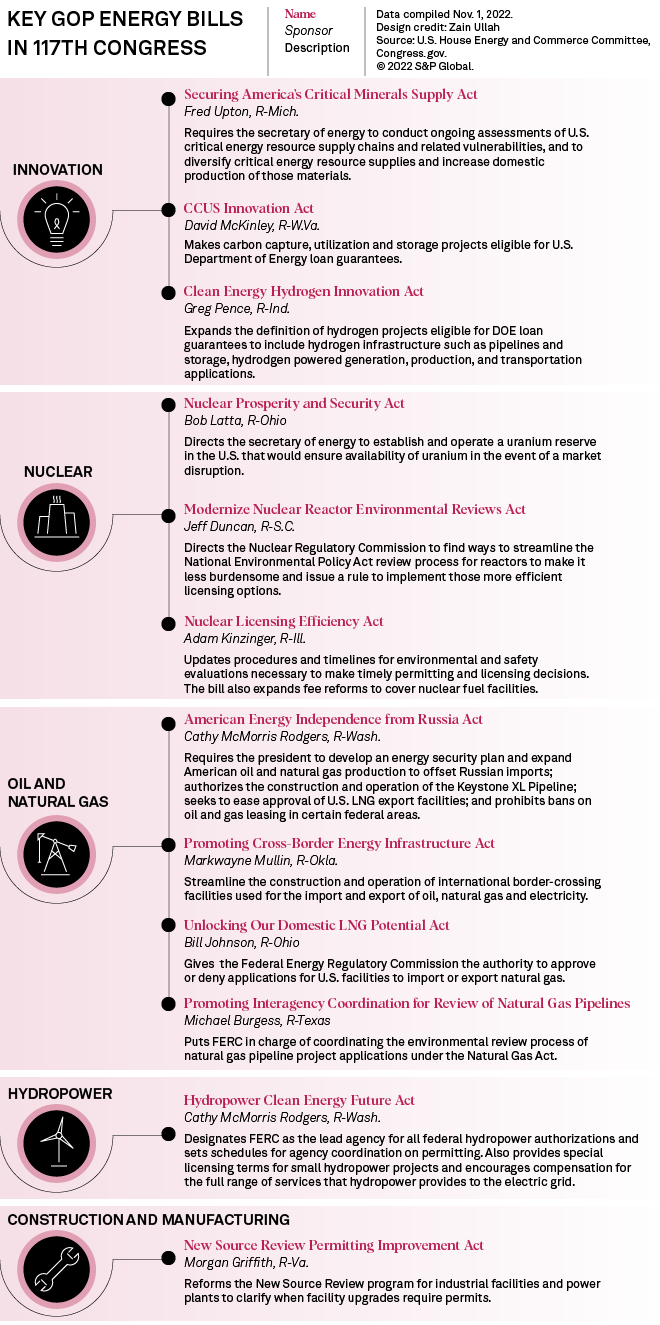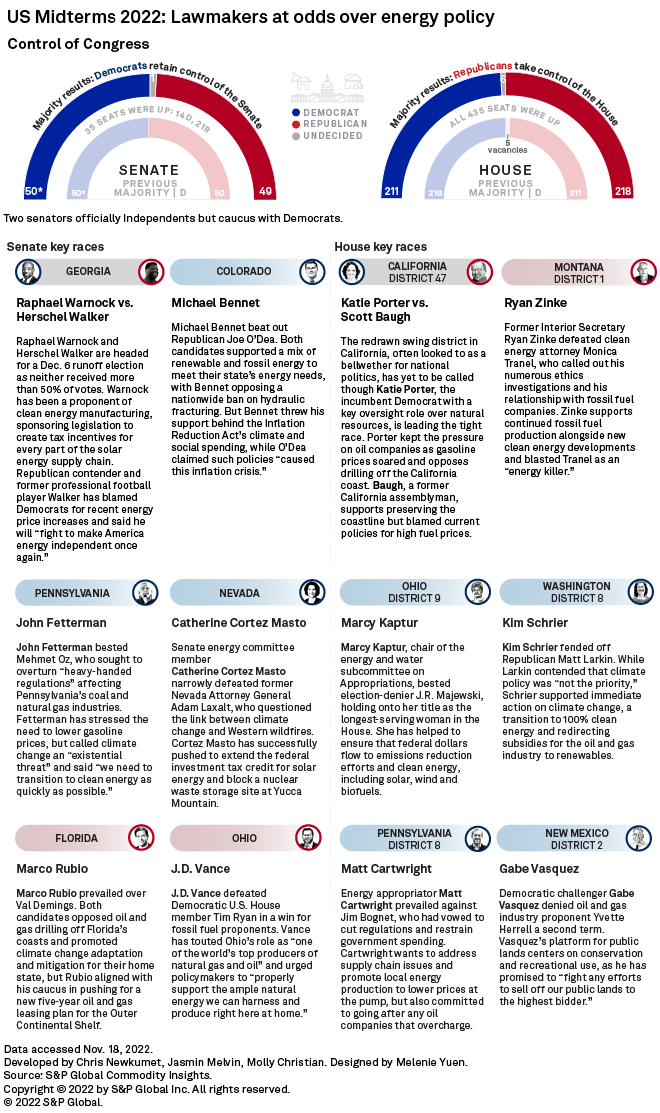S&P Global Offerings
Featured Topics
Featured Products
Events
S&P Global Offerings
Featured Topics
Featured Products
Events
S&P Global Offerings
Featured Topics
Featured Products
Events
Banking & Capital Markets
Economy & Finance
Energy Transition & Sustainability
Technology & Innovation
Podcasts & Newsletters
Banking & Capital Markets
Economy & Finance
Energy Transition & Sustainability
Technology & Innovation
Podcasts & Newsletters
S&P Global Offerings
Featured Topics
Featured Products
Events
17 Nov, 2022

By Molly Christian

| U.S. Rep. Cathy McMorris Rodgers, R-Wash., is poised to lead the House Energy and Commerce Committee next Congress. Source: Kevin Dietsch/Getty Images News via Getty Images North America |
Republicans managed to narrowly retake control of the U.S. House of Representatives in the midterm elections, a power shift that could place speedbumps in front of Democrats' climate ambitions.
As of Nov. 16, the GOP had secured the 218 seats needed to win a majority of the 435-person House, according to projections from the Associated Press. A Republican-controlled House is expected to ramp up oversight of recent climate and energy laws, although a sustained Democratic majority in the Senate and President Joe Biden's veto powers will chill efforts to pass legislation that runs counter to the Democrats' agenda, including decarbonizing the electricity sector by 2035.
The return of a GOP-run House for the first time in four years will fortify policy support for U.S. oil and gas production. Republicans have criticized Biden's efforts to swiftly transition away from fossil fuels, blaming his policies for higher oil and gas prices.
In the current Congress, Republicans on the House Energy and Commerce Committee, led by ranking member Cathy McMorris Rodgers, R-Wash., introduced legislation to bolster domestic oil and gas production. The GOP focus on such legislation intensified after Russia's invasion of Ukraine and the resulting restrictions on Russian energy imports to Europe and the U.S.
The bills, which could present a starting point for policy negotiations, sought to streamline approvals for liquefied natural gas exports, ensure access to fossil fuel leases in federal areas and ease the construction of cross-border infrastructure such as oil and gas pipelines.
GOP lawmakers vow to conduct stringent oversight of Biden's energy and climate agenda. Targets include the implementation of the Inflation Reduction Act, which was signed in August and contained nearly $370 billion in clean energy and climate spending, as well as the roughly $1.2 trillion bipartisan infrastructure law of 2021.

The U.S. Energy Department, which received $62 billion from the infrastructure law, could be an oversight target. During the Obama administration, the DOE came under fire from congressional Republicans when solar-panel maker Solyndra filed for bankruptcy after receiving a $535 million DOE loan guarantee. That money was made available through the American Recovery and Reinvestment Act of 2009.
With a House majority, Republicans will watch for potential missteps in distributing the Inflation Reduction Act and infrastructure law funding.
"Our industry is much more mature [today]," Abigail Ross Hopper, president and CEO of the Solar Energy Industries Association, said during a Nov. 9 webinar hosted by Bracewell LLP. "However, that doesn't entirely eradicate the risk."
Common priorities
Despite their differences, Democrats and Republicans share mutual energy and climate priorities that might create a path for bipartisan cooperation.
Lawmakers from both parties voted in recent years to expand federal funding for clean energy research and development. Democrats and Republicans alike have also called to streamline permitting of energy infrastructure projects, albeit with different ideas on how to achieve that goal and which projects to prioritize. Bipartisan support also exists to improve domestic access to minerals needed for the clean energy transition.
With
Harrell doubted Republicans will seek to claw back spending in either the Inflation Reduction Act or infrastructure bill, both because of Biden's veto powers and the potential popularity of increased federal investment in red states with renewable energy potential.
"Outright rescission bills can't pass in a split Congress or a narrow Congress," Harrell said.
Spending headaches
Although Republicans will struggle to enact big legislation without bipartisan support, they can still hinder Biden's climate efforts.
GOP lawmakers might try to use the appropriations process to restrict agency funding to implement certain rules or increase staffing, Tom Hassenboehler, a partner with energy policy consulting firm the Coefficient Group, said during an elections webinar hosted by S&P Global Commodity Insights.
When crafting appropriations bills, "[policy] riders and other things have been successful in limiting authorities," said Hassenboehler, a former chief counsel for energy and environment at the House Energy and Commerce Committee.

S&P Global Commodity Insights produces content for distribution on S&P Capital IQ Pro.
